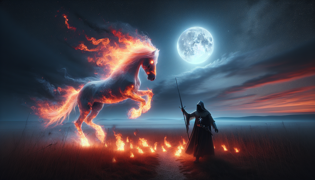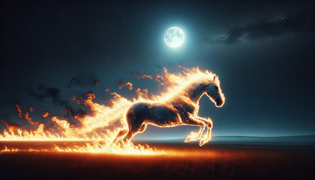Introduction
The vast, open plains of the Hungarian Puszta stretch to the horizon, a sea of golden grass undulating under a pale moon. It was here, beneath the vault of stars and the chill of a desert wind, that the legend of the Fiery Steed was born. In the old days, villagers spoke in hushed tones of a midnight specter—a horse whose mane burned like living flame, whose hooves left glowing embers in its wake. They said it was the spirit mount of János Székely, a fearless cavalryman betrayed by those he trusted most, murdered in cold blood on the eve of a glorious campaign. Instead of passing quietly to the next world, János cursed the earth that bore false friends. His spirit bound to his magnificent charger, he became a blazing figure of vengeance. By candlelight, mothers warned restless children that if they strayed too close to the open fields at dusk, they might hear the thunder of ghostly hooves and see a fiery shape racing beneath the moon. That sight promised both wonder and foreboding: for wherever the steed roamed, fate’s scales tipped toward balance, and those who had spilled innocent blood might glimpse their wrongs laid bare. Still to this day, travelers along the back roads near Kiskunság whisper about distant cries and flickers across the horizon—signs that János and his fiery companion patrol these plains until justice is served.
Whispers in the Tall Grasses
The first time the villagers heard the thunder of hooves, it was like a storm rolling across the horizon. From their thatched cottages, they saw far off a burning shape slicing through the tall grasses. It moved too fast, a blur of fire and muscle, and they felt its approach before they saw it: a sudden glow on the wind, the scent of scorched earth carried on a cold breeze.
Old Balázs, the shepherd, swore the ghostly horse paused at the edge of his flock, nostrils flaring as though sniffing for a familiar scent. When Balázs called out, his voice barely carried above the roar in his ears. The steed tilted its head, eyes such as burning embers reflecting the moon, and then it vanished—flame extinguished as if swallowed by the earth—leaving nothing but trampled grass and a faint wisp of smoke.

Rumors spread that beneath that fiery presence lay a deeper sorrow. If one dared follow the scorch marks before dawn, they often found a single object left behind: a tarnished sabaton from a warrior’s greave, or a piece of red silk once folded over a letter of betrayal. Each fragment spoke of a story unfinished, a debt unpaid, a cruel promise broken.
By campfire light, the shepherds and wayfarers wove these fragments into a tapestry of whispers. They spoke of János Székely, loyal to the crown until his own blood forsook him. His horse, a steed prized above all, had been set alight by enemies who feared the pair’s valor. So the warrior’s oath spanned death itself: to chase every falsehood across the plains until justice was won.
The Warrior’s Vow
János had been a captain of renown, raised on tales of King Matthias’s court and taught to fight for honor. He rode at the vanguard of every skirmish, his courage tempered by devotion to his men. Yet it was not the Turks that felled him—no, it was the envy of a comrade, a whisper twisting loyalty into deceit. Under cover of dark, they ambushed him and left his body beneath the stones of an old well, hoping the earth would claim him.
As his spirit drifted, anger propelled him back: first as a wisp of smoke, then as a flame that found his stolen steed. He seized the reins in the realm between worlds, forging with spectral fire a new shape for vengeance. Thus was born the Fiery Steed: half-shadow, half-ember, alive with the warrior’s oath.

On nights when the moon shone full, János returned to the site of his betrayal. He struck the ground with incandescent hooves until the earth remembered his oath. From the embers rose echoes of voices—his own last prayer for mercy, the gasp of betrayal, the crushed hope of a father’s blessing. He fed these voices into the fire that fueled the steed, weaving each memory into the horse’s burning coat.
Villagers who had lost kin to injustice scarcely heard his approach before the sky lit up with flickering embers, and they felt shame before they felt fear. For János’s justice did not come as death—it came as revelation. Old debts surfaced, false promises were unmasked, and hearts hardened by fear trembled at the breath of red-hot air on their cheeks.
Midnight Justice on the Plains
By the time the steed thundered across the lands of Tisza and Hortobágy, its legend had spread to every shepherd’s fire. They said it paused only for those who bore guilt, sniffing the air for perfidy before its blaze would flare most bright. In distant fields, farmers woke to smoldering ruts that led directly to the doors of landowners who had cheated them of seed or stolen the meager harvest.
In one village near Szolnok, a corrupt bailiff had seized a widow’s few sheep. That very night, the ground cracked open with the steed’s hooves, and the bailiff awoke to find every sheep returned to the pen, their fleeces scorched bright orange. At dawn he wept, promising at the mercy of a justice that felt older than any human law.

Yet the steed was not cruelty incarnate. Once, a young boy chased after the glowing glow, thinking it a trick of lightning. The horse slowed, its great head tossing embers into the air, and the boy felt a warm breath on his neck—an invitation, not a threat. When the flame subsided, the boy saw a single red feather at his feet, as if to remind him that innocence could be its own true armor.
Across the plains, then, the Fiery Steed fulfilled its vow. It neither spoke nor stayed for applause—it roared, it glowed, and it vanished. But in its wake, wrongs were righted, hearts were humbled, and the ancient earth remembered that balance favored the brave and the true.
Conclusion
As dawn tinted the eastern sky with pale pink, the Puszta lay silent once more. The fields bore no trace of the night’s fiery visitor—only scorched earth and scattered embers that glowed faintly until the sun claimed the horizon. Yet each reflex of light told a story of betrayal undone, of promises reclaimed, of the warrior’s promise that transcended death itself. Mothers would lead their children in prayer, shepherds would bless their flocks, and wayfarers would recount every ember and echo until the legend burned bright anew in every hearth. For as long as injustice lurked in shadow, so long would the Fiery Steed ride the midnight plains, reminding all who watched that courage can outlast life, that redemption can be forged in flame, and that a single oath, sworn in truth, endures beyond the boundaries of mortal time. Thus the legend endures—a testament to the spirit of János Székely and his undying quest for justice across the vast, haunting beauty of the Puszta.


















